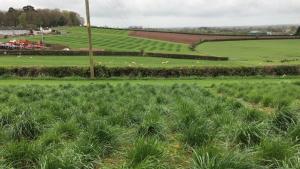Eighteen varieties bred by the Agri-food and Biosciences Institute (AFBI) have been included on the recently released 2019/2020 Recommended Grass and Clover Lists (RGCL), highlighting the huge success of the grass breeding programme at AFBI, Loughgall.

All varieties from the Department of Agriculture, Environment and Rural Affairs (DAERA) supported grass breeding programme at Loughgall are marketed through AFBI’s commercial partner Barenbrug UK Ltd, as part of an ongoing and highly successful grass breeding partnership.
Dundrod enters the list in 2019 as AFBI’s newest late heading diploid variety, in what is an important new addition to AFBI’s late diploid perennial ryegrass portfolio. Dundrod heads on the 2 June and is an excellent all-around performer, producing high annual yields of good quality grass under both grazing and conservation management. In official trials, Dundrod showed a very good balance of yield across the season with excellent spring and autumn growth, particularly under silage management. Dundrod also has excellent resistance against crown rust, a disease that is becoming an increasing problem on farms in Northern Ireland due to its detrimental effect on sward production and palatability. The first Dundrod seed is expected to be commercially available in small quantities from the 2021 UK harvest through AFBI’s commercial partner, Barenbrug UK Ltd.
Other outstanding varieties from the 2019/2020 Recommended Grass and Clover Lists (RGCL) include Galgorm and Fintona, which both maintain their position as two of the highest yielding varieties on the list. Galgorm is the latest AFBI-bred intermediate heading diploid perennial ryegrass, and tops its category for both yield and quality. No other intermediate diploid variety on the list produced more metabolizable yield per hectare (ME yield/ha) than Galgorm under either grazing or silage management (109% and 103%, respectively, of the mean of all intermediate diploid varieties on the list), cementing its place as one of the leading intermediate diploid perennial ryegrass varieties in the UK. Fintona is the latest AFBI-bred intermediate tetraploid variety, and is one of the top intermediate heading tetraploid varieties. It produced high yields of 104% and 108% under grazing and silage management, respectively, compared with the mean of all intermediate tetraploid varieties on the list. Importantly, Fintona has an extremely high resistance to leaf-spot disease, which is prevalent across N. Ireland, and is therefore ideally suited to growing conditions on farm in N. Ireland.
The AFBI grass breeding programme
The 18 varieties included on the 2019/2020 RGCL hail from a long line of excellent varieties produced by the highly successful DAERA supported AFBI grass breeding programme at Loughgall. Advances in grass breeding research mean that new varieties coming onto the market show improvements in traits such as yield and nutritional quality compared with varieties currently available. AFBI grass varieties are used in 70% of seed mixtures in Northern Ireland, and are extensively used across the UK and Republic of Ireland.
Grass is the most important crop on farms in Northern Ireland and one of the most efficient ways of improving productivity from grass is to breed varieties which are well adapted to local farming conditions. Ongoing research and development at the AFBI Loughgall grass breeding programme ensures that a steady supply of new varieties like Dundrod, Galgorm and Fintona are produced that can meet the ever changing demands of the grassland industry in Northern Ireland.
View the 2019/2020 Recommended Grass and Clover Lists (RGCL)
Latest news
- AFBI issues Nematodirus warning – Spring 2025 11 April 2025
- Managing Nature Based Risks to the UK Economy and Opportunities for Green Finance 08 April 2025
- AFBI Hillsborough host AERA committee 27 March 2025
- The Omics Days Conference 27 March 2025
